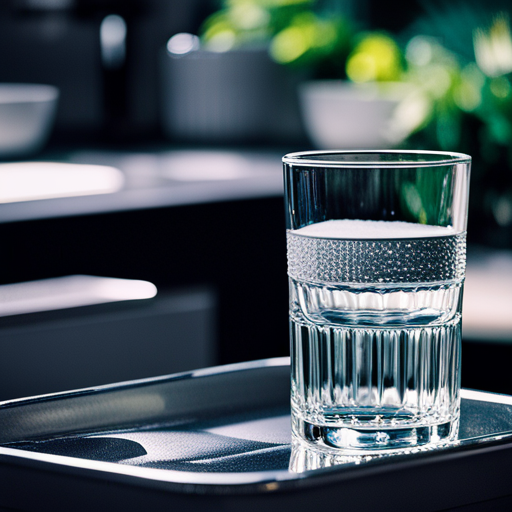Are you tired of drinking and using hard water that leaves a residue on your dishes and leaves your skin feeling rough? Look no further than Seattle, where the soft water is not only safe for consumption but also provides better tasting and cleaning capabilities.
With a hardness level of only 1.4 gpg and 21.5 mg/L as calcium carbonate, Seattle’s water is one of the softest in the United States. Thanks to the city’s commitment to preserving its natural resources, Seattle’s water sources are carefully monitored and treated to maintain their quality.
This means that you can enjoy the benefits of soft water without any worries. In this article, we’ll explore the sources of Seattle’s water, how the city reduces mineral content, and why soft water is the way to go for a better taste and clean.
So sit back, relax, and let’s dive into the world of Seattle’s soft water.
Key Takeaways
– Seattle’s water is safe for consumption and has a good taste.
– Seattle has soft water with a hardness ranging from 1.29 to 1.54 gpg.
– The sources of Seattle’s water include Tolt River Watershed, Cedar River Watershed, and underground wells.
– Seattle’s coastal location has better odds of receiving soft water.
Water Quality Overview
You’ll be happy to know that Seattle’s water quality is safe for consumption, has a good taste, and is considered soft water with a hardness of 1.4 gpg and 21.5 mg/L as calcium carbonate.
The sources of Seattle’s water include the Tolt River Watershed, Cedar River Watershed, and underground wells. The Tolt River Watershed provides 30% of drinking water with a low average calcium carbonate hardness of 1.2 gpg, while the Cedar River Watershed provides 70% of drinking water with an average calcium carbonate hardness of 1.4-1.6 gpg. Lynnwood’s artesian well has moderately hard water with a calcium carbonate hardness of 72.3 mg/L.
Water hardness measurement is important because it determines the mineral content in water. Soft water has a lower mineral content than hard water, which can cause scaling deposits, clogged pipes, and an unpleasant taste or smell.
In contrast, soft water has many benefits, including better cleaning capabilities, improved lathering of soaps and detergents, and a reduction in mineral stains and soap scum. With Seattle’s soft water, you can enjoy better tasting and cleaning capabilities without the need for water softeners, reverse osmosis filters, or bottled water.
Sources of Seattle’s Water
If you’re curious about the sources of the water in this area, it comes from the Tolt River Watershed, Cedar River Watershed, and underground wells. The Tolt River Watershed provides 30% of the drinking water, while the Cedar River Watershed provides 70%.
Both watersheds have relatively low average calcium carbonate hardness levels, making Seattle’s water generally soft. Additionally, some of the water supply comes from Lynnwood’s artesian well, which has moderately hard water.
Having soft water in Seattle has its advantages, including better tasting and cleaning capabilities. It also means less wear and tear on appliances, as hard water can cause scaling deposits and clogged pipes.
With Seattle’s water hardness ranging between 1.29 and 1.54 gpg, residents can enjoy the benefits of soft water without having to worry about the negative effects of hard water on their appliances.
Reducing Mineral Content
To reduce the mineral content in your drinking water, consider using water softeners, reverse osmosis filters, or bottled water. Water softeners work by replacing hard minerals, such as calcium and magnesium, with softer minerals like sodium. This process can help prevent scaling deposits and clogged pipes, as well as improve the taste and smell of your water. However, keep in mind that water softeners can increase the sodium content in your water, which may not be suitable for those on a low-sodium diet.
Reverse osmosis filters are another option for reducing mineral content in your water. This process involves forcing water through a semi-permeable membrane, which removes impurities such as minerals, bacteria, and viruses. Reverse osmosis filters can provide pure and clean drinking water, but they can also be expensive and require regular maintenance.
Bottled water is also a convenient option for those who want to avoid the mineral content in their tap water. However, it is important to choose a reputable brand that is tested and certified for safety and quality.
Conclusion
So now you know that Seattle has some of the softest water in the United States. But what does that mean for you?
Well, it means that you get to enjoy better tasting and cleaner water! With a hardness level of only 1.4 gpg, Seattle’s water is safe for consumption and has a great taste. Plus, it’s easier on your appliances and plumbing, which can save you money in the long run.
Compared to other cities in the US, Seattle’s water quality is definitely something to brag about. So the next time you take a sip of water or wash your dishes, take a moment to appreciate the benefits of Seattle’s soft water. And if you’re not lucky enough to live in Seattle, consider investing in a water softener to enjoy the same benefits in your own home.
